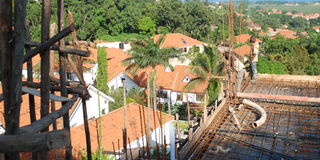Pains and gains of building your dream home

What you need to know:
Becoming a home owner is an aspiration for many. But how they do that has always been a debate, while many enjoy the process of building a house, brick by brick, others like cutting out the stress by purchasing an already complete house.
There are a number of avenues through which you can become a home owner. If you do not buy one that is already built, you are most likely to oversee one constructed from the foundation until it is complete.
Building is a commitment that requires supervision, time and money that it normally takes a longer time than buying.
For instance, Nuruh Ashaka built her house in 2010. She says the construction took approximately two years because there was halting at some stages. No matter how long it may have taken, Ashaka says she is happy because she got what she wanted.
“I wanted some rooms in the house built to suit my preference. I wanted the kitchen sinks and cooker built towards the kitchen walls. I wanted the master bedroom with its inbuilt bathroom and one other bathroom for all other people in the other rooms of the house. There are home owners who want every bedroom with its bathroom but this comes at a cost I wasn’t ready for,” Ashaka recalls.
The advantage with building, Ashaka, argues, is that if your builders cannot execute what you want, you would be satisfied that it is what you consented to in the initial house plan; but that when you buy, you take what the house owner’s wish and designs were. Then also, if you are buying, the seller will increase the cost of the house to make a profit and you end up paying a lot more money than you would have spent if you built.
Building in phases
Ashaka reiterates that the duration of completion of a construction project is primarily determined by cash flow. When the cash is available, the construction may even take place night and day if you so wish. However, there is also the flexible aspect of building in phases when the money is not readily available.
“Whenever I got money, I would build from one phase to another. At one point, I built from the foundation to the ring beam level and halted it for some time. When I got the money, I started from the ring beam and did the roofing before halting again,”he says.
“The project was that flexible because I wasn’t in a rush. If I were to buy, I would be put on pressure from the seller to complete the payments. Buying couldn’t give me the option of owning a home by building in phases. When you buy a house and pay in instalments, the seller may want the balance when you do not have ready cash,” she adds.
According to Ashaka, one of the many advantages of overseeing the construction of your home is that it allows you change some sections or designs you don’t want, or change some parts of the house to suit your desires, unlike buying where it is very hard to change already built sections.
For instance, when buying a house, you may get a house that has the kitchen size you want but without a walk-in wardrobe yet you one.
Building experience
Ashaka is also quick to share that building is something you cannot run away from. There is a high possibility of finishing one project and start another. So, by building your own home, it gives you get the experience and lessons on how to handle future projects. It also helps you understand why certain things are done in certain ways.
Why you should buy
Regardless of the many things that can be said about building your future home, some people prefer avoiding dirt on their hands twice – they don’t want to struggle to make the money and later go through hardships of turning bricks into a house.
Thus, they rather buy one.
Unlike Ashaka, Nicholas Tumwesigye bought his four-bedroomed family house in Bulindo in 2018 at Shs320m. At that time, Tumwesigye says all he wanted was a house for his family regardless of how it was built or the number of bedrooms it had. He is also quick to agree that if he had the patience to build his own, it would cost him much less than Shs320m.
“I did not want to be subjected to the stress of seeing a house being built from the foundation until it was completed. The one I bought was not my dream house but my family has got a permanent address,” he says.
Joseph Oryang, an engineer with Century Investors Limited explains that when choosing to own a home, you cannot approach it from an engineering perspective because it includes things to do with costs and convenience. You have to look at the building and buying options and look at the pros and cons and see what you can manage and the level of risk you are ready to take.
Pros of buying
Oryang agrees with Tumwesigye, stating that the advantage of buying a house is that you do not only have less hustle and stress but that you also have the opportunity to pay for what you are ready to put up with. If you see something in the house that was not properly done, you just don’t buy it but still look for what you want.
“To a great extent, the decision to buy or to build a house depends on you. You might find an estate arrangement, for instance a block of flats with a good created ambience you buy into. It may cost a lot but you get into an ambience you don’t have to struggle with,” Oryang starts.
Cons of buying
On the other hand, Oryang opines that the disadvantage of buying an already built house is that you normally get a higher final cost like Tumwesigye, yet, you’re not informed about the quality of construction. For instance, the house you buy could have been built without concrete foundation yet it is key for the strength and durability of any house.
“Some home owners are good at putting up poorly built houses and dress or finish them nicely to look appealing on the surface. You cannot be too certain about what is underneath with things like the foundation and the quality of the structural work, plumbing and electrical pathways, among other key factors,” Oryang points out.
The other disadvantage of outright buying is that you need to have money in a lumpsum. If you have got less money and you rely on cash flow, which may not be consistent, it is difficult to buy a house.
“If you are to use lump sum payments, it means you have to go for a loan and this comes with interest rate challenges. The challenge with big loans to buy a house is that they make you a financial institution or money lending prisoner where you may end up losing your house as collateral ,” he argues.
Pros of building
Like Ashaka, building your own house gives you the opportunity to do it in phases to match your cash flow. However, if you have the money ready, you can still build nonstop until the house is complete.
“You have the opportunity to control the final outcome. It requires that you have a skilled project manager. If you are not up to it, you have to enlist a project manager. Most prospective home owners think that building yourself exposes you to losses and other challenges. This is often because you do not use professionals and want to deal directly with the foremen or builders who are not qualified conductors to create order out of the project,” Oryang says.
Daniel Kyeyune, a construction technician agrees with Oryang, reasoning that having the money doesn’t mean you are good at project management. You need to hire a skilled project manager to oversee the project and watch from a distance to control the outcome and quality. You will have a lower cost and at the same time acquire knowledge why some things are done in a particular way.
On the other hand, the disadvantage with building is that you are limited by the skills of your construction team if you don’t have good project management. You have to be involved in every hustle or stage, but this can be mitigated by using a professional team and just check out the general progress of everything as and when you want.
Costing
When it comes to costing, Oryang and Kyeyune agree that you get the project done cheaply when you build yourself. But again, this is where you do it using professionals. If you don’t use professionals, you will get what you want much cheaper but this will compromise the quality of the work.
“If a real estate dealer is selling a house, they will definitely want to make a profit. This is why buying is more expensive than building. If you are to build a house using Shs200m, you will have to part with between Shs250m to Shs300m to buy the same house,” Oryang says.
When buying a house, it is not only the construction costs that come into play, but the property value also chips in. You can have a house that costs Shs200m to build but if it is in a developed place and setting such as Buziga, Najjeera, Bukoto, Munyonyo or even Lubowa, you can sell it at Shs500m.
The payment is not only for the house but also for the surrounding place. When a place is underdeveloped, the projections are normally low and when it is developed, the price automatically goes up, not just for the house but for land as well.




